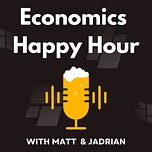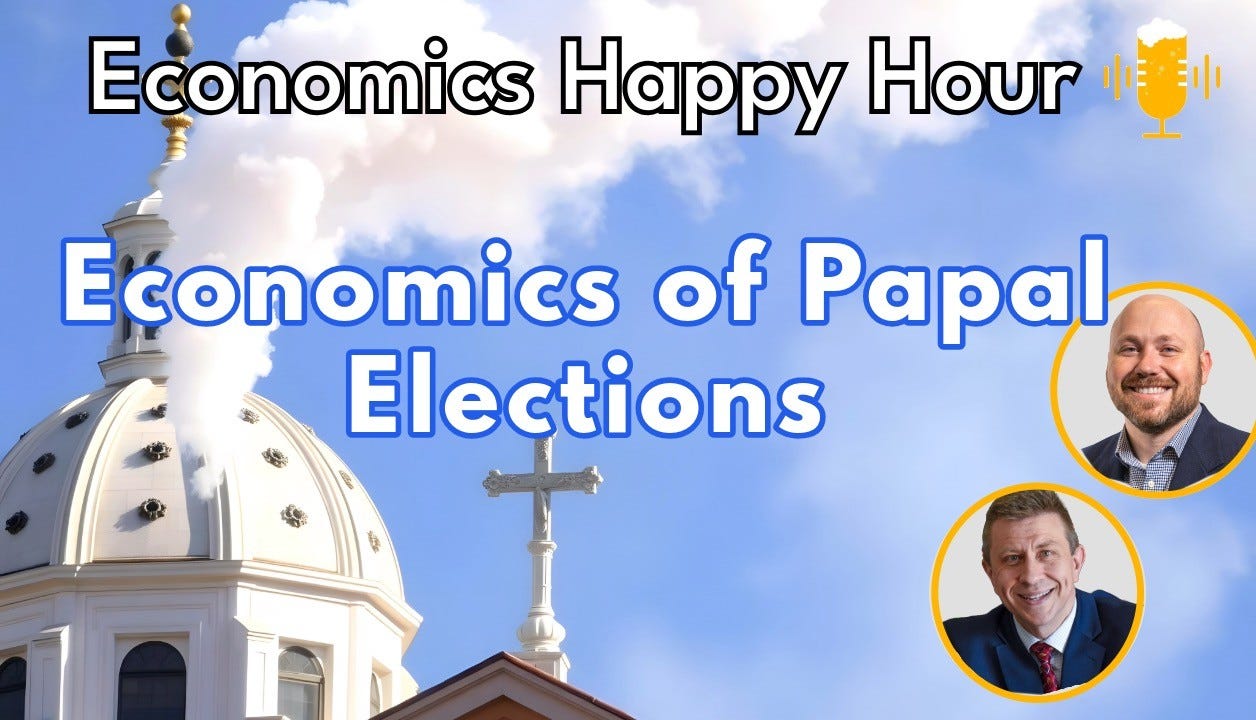In this episode, we look at how economists think about the election of a new Pope. With the recent selection of Pope Leo XIV, Matt and Jadrian break down how the conclave’s voting rules, like the two-thirds supermajority, can shape outcomes. They connect it to economic ideas about group decision-making, from majority rules to the challenges of reaching consensus. It’s a timely example of how even religious elections follow patterns that economists love to analyze.
In this episode, we discuss:
How economists analyze voting rules
The concept of majority vs. supermajority decision-making and its economic implications
The potential influence of internal costs and decision-making incentives in a conclave
And a whole lot more!
Catch up on some old episodes:
You can also listen to us on Google Podcasts, TuneIn Radio, and Apple Podcasts. If one of these is your go-to podcast service, be sure to rate us and subscribe!
Watch this episode on YouTube:
Some show notes:
The semester is winding down, and commencement season has arrived. Jadrian is sipping on a Double Broken Heels Hazy IPA from New Trail Brewing, strong enough to require pacing. Matt opted for a citrus wheat beer from Mill Street Brewery in Canada, a memento from a recent trip north. The drinks don’t exactly match the day’s theme, but as they admit, they're only minimally prepared anyway.
Neither host is Catholic, though Matt has some childhood experience with the Church. With that out in the open, they offer a blanket apology for any inaccuracies that might creep into a discussion about papal traditions. Still, they’re intrigued by how the election of a Pope offers an unexpected lens into economics and decision theory.
This episode builds on Jadrian’s latest Monday Morning Economist newsletter, inspired by a suggestion from Noah Trudeau. The conversation centers on how the Pope is chosen through a voting process that requires a two-thirds supermajority. That’s a high bar, but it ensures consensus among a very ideologically diverse group of cardinals. The result is a leader who must appeal broadly, not just to a simple majority.
They connect this to Buchanan’s Calculus of Consent, which highlights how collective decision-making involves tradeoffs between internal and external costs. When opinions diverge widely, a supermajority rule can help prevent polarizing outcomes, but it also risks gridlock. They explore what might happen under different rules, like plurality voting or elimination-based rounds, and discuss quirks like the Condorcet Paradox, where no option wins because group preferences are circular.
In the end, the super majority rule seems well-suited for a lifetime appointment with global implications. Early reports suggest that Pope Leo wasn’t an initial favorite and may have been eliminated under a different system. But the conclave’s insistence on broad agreement allowed a compromise candidate to emerge, one who happened to be the first North American Pope. A unique outcome, shaped not by doctrine, but by the rules of the vote.
This week’s pop culture references:
Matt picked a track from Hamilton, “The Election of 1800.” It’s a musical retelling of one of the most dramatic elections in U.S. history, where the presidential vote ended in a tie and had to be decided in the House of Representatives. Jefferson ultimately won, but the whole sequence offers a memorable look at how complex and contentious voting outcomes can be.
Jadrian brought in a scene from Parks and Recreation, where Ben tries to choose a wedding caterer. He enlists Ron, Tom, and Chris to help, knowing their tastes couldn’t be more different: Ron wants meat, Chris prefers vegetables, and Tom just wants something “Instagrammable”. Unsurprisingly, they can’t agree. Ben breaks the tie in favor of calzones, his favorite, but the scene cleverly illustrates how individual preferences can make group decisions messy when there’s no clear majority.



















Share this post